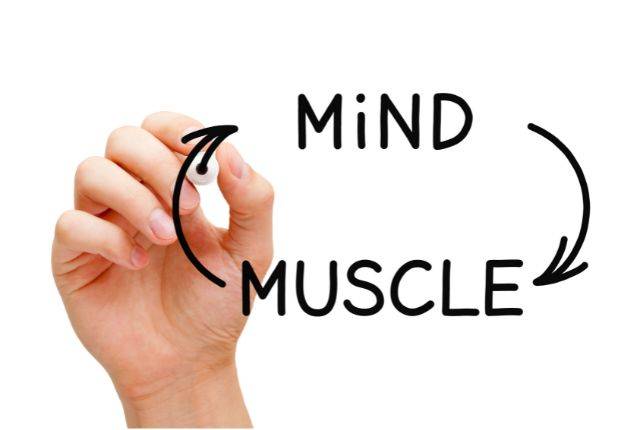
In this article we will cover some common mistakes when building muscle.
These errors can slow down your progress, so understanding these hurdles can pave the way for successful muscle-building.
See also – How To Gain Muscle: 13 Proven Keys For Optimal Growth
How to Get Big Biceps: Your Ultimate Guide
Nutrition Mistakes For Muscle Building
The Role of a Balanced Diet and Protein
When it comes to building muscle, the food you eat plays a crucial role.
Most people underestimate the amount of protein they need and neglect a balanced diet.
Proteins, carbs, and fats are the three macronutrients that fuel your body and contribute to muscle growth.
Proteins are the building blocks for muscles, carbs provide energy for your workouts, and fats support hormone production, and provide a source of secondary energy.
Imagine your body as a car: just as a car needs the right fuel to run smoothly, your body requires a balanced diet to optimize muscle building.
Tip: A helpful approach is to include a source of protein in every meal, such as chicken, diary or legumes.
Protein powder is optional, but a convenient way to get more protein in.
Consequences of Poor Nutrition
Neglecting nutrition can significantly hamper your muscle-building goals.
Insufficient protein intake might lead to slower muscle recovery and growth. Similarly, not consuming enough carbs can leave you feeling tired and unable to perform your best during workouts.
I’ve seen many gym-goers struggle to bulk up, only to realize that their diet was the missing link.
See also – How To Gain Muscle As A Skinny Guy
Skipping Warm-ups and Cool-downs
The Significance of Warming Up
A warm up gradually prepares your body and muscles and helps prevent injuries.
Warm-up exercises increase blood flow to the muscles, improving flexibility and performance.
The difference between a warmed-up muscle and a cold one is like the difference between a rubber band at room temperature versus one in the freezer. The latter is much more likely to snap when stretched.
Tip: Incorporate some light warmup exercises, like using just the barbell with no weight on it, to get the mind and body primed.
The next warm-up set might have 30 to 50% of weight on it, depending on exercise and how well you feel warmed up.
Cooling Down for Recovery
Cooling down is just as essential as warming up. It helps to gradually bring your heart rate down and start the recovery process for your muscles.
Simple stretches and light movements can ease you out of the intense workout zone, reducing muscle soreness later on.
Overtraining and Under-recovery
Risks of Overtraining
In the enthusiasm to build muscles quickly, some people fall into the trap of overtraining.
This leads to a condition known as overtraining syndrome, characterized by fatigue, decline in performance, and increased risk of injuries. It’s like trying to run a car engine without giving it time to cool down; eventually, it overheats and breakdowns.
The Necessity of Rest
Under-recovery is a common mistake where individuals don’t give their muscles adequate time to heal and grow after rigorous workouts.
Rest is when the magic happens: muscles repair themselves, becoming stronger and bulkier. Without proper rest, you may find yourself stuck in a cycle of workouts with little progress.
Tip: Ensure you have at least 2 rest days per week and get adequate sleep to maximize muscle recovery.
Ignoring Proper Form and Technique
Quality Over Quantity
When trying to build muscle, it’s tempting to focus on the number of reps and sets. However, prioritizing proper form is crucial.
Imagine building a house: it’s not about how quickly you can stack bricks but how solidly they’re laid. The same principle applies to exercise.
Focusing on correct technique ensures that you target the right muscles and prevent injuries.
Tip: Take time to learn and practice the correct form, even if it means lifting lighter weights or doing fewer reps.
Consequences of Poor Gym Technique
You see it all the time on TikTok and YouTube, people swinging weights that are too heavy for them.
Compromising on form can lead to ineffective workouts and even injuries.
Poor technique may lead to strains and long-term damage, significantly hampering your muscle-building journey.
Lack of Consistency In The Gym
Regularity in Workouts
Consistency is the key to any endeavor, and muscle building is no exception. Sticking to a regular routine is like watering a plant regularly. Just as a plant won’t thrive if watered sporadically, muscles won’t develop optimally without consistent effort.
Tip: Set a workout schedule that suits your lifestyle and stick to it.
Impact of Sporadic Training
Inconsistent workouts can significantly hamper progress. Muscles need a consistent stimulus to grow and strengthen.
Focusing Only on Certain Muscle Groups
Importance of Muscle Balance
Neglecting certain muscle groups can lead to imbalances and even injuries.
For example, only focusing on chest and neglecting the back can lead to poor posture and muscular imbalance. It’s like overpacking one side of a backpack – eventually, it’ll tip over.
Not Varying Workouts
Understanding Workout Plateaus
Doing the same routine for months and months can lead to a plateau, where progress seems to stall.
The body adapts, and you can get bored of the same routines.
Mixing Up Routines
Varying your workouts in macro cycles keeps your muscles guessing and can reignite growth.
Tip: Include different exercises, intensity levels, and equipment in your workouts to keep things exciting and effective. As an example a power phase of lower reps for a micro cycle.
Inadequate Hydration
Role of Water in Recovery
Just like plants need water to grow, your muscles need hydration to recover and build. Water plays a vital role in transporting nutrients and aiding in muscle recovery.
Staying hydrated ensures nutrients flow efficiently to your muscles.
Tip: Keep a water bottle handy during workouts to remind yourself to stay hydrated.
Consequences of Dehydration
Dehydration can slow down that traffic of nutrients, leading to suboptimal muscle recovery and growth. It can also cause fatigue, cramps, and reduced performance during workouts.
Neglecting Sleep and Rest
Sleep’s Impact on Muscle Growth
Sleep is like the silent knight of muscle growth. During sleep, your body repairs and grows muscles. It’s like a construction crew working overnight to build a building.
The connection between sleep and recovery is crucial for anyone looking to gain muscle.
Risks of Chronic Fatigue
A lack of sleep can lead to chronic fatigue, hindering your workout performance and slowing muscle growth.
Inadequate rest can also lead to a less productive gym session.
Unrealistic Expectations
Timeframe for Muscle Growth
Building muscle is a slow and steady process.
Expecting rapid gains is akin to expecting a tree to grow overnight. Setting realistic goals ensures you stay motivated and understand that progress takes time.
Encouraging Patience
Understanding that muscle building is gradual promotes patience.
Just like a sculptor takes time to shape a masterpiece, crafting your physique is a process that requires persistence and commitment.
Lack of Progressive Overload
Importance of Increasing Resistance
Progressive overload in muscle building, means gradually increasing resistance or intensity in your workouts to continue making progress.
Tip: Add more reps, increase difficulty, or intensify your workouts progressively. While using good form.
Mistakes in Routine Intensity
Stagnating workouts, like reading the same page of a book over and over, can lead to a plateau. It’s important to recognize when it’s time to increase the challenge.
You don’t have to go to failure in every set, but try to increase reps or the weight on most sets.
Ignoring Mind-Muscle Connection
Benefits of Focused Workouts
The mind-muscle connection is about focusing on the muscles being worked during exercise.
This focus can enhance workouts, making each movement more effective, much like paying close attention during a movie lets you catch all the details.
Some exercises and body parts like the biceps benefit from the mind – muscle connection.
Lack of focus during workouts may hinder progress in muscle building.
FAQs – Common Mistakes When Building Muscle Frequently Asked Questions
- Why is proper form important when trying to build muscle?
Proper form ensures that you are targeting the correct muscles and helps prevent injuries. Think of it as following a recipe – using the right techniques ensures a successful outcome.
- How can overtraining affect my muscle-building goals?
Overtraining can lead to fatigue, injury, and hindered progress. Your muscles need time to repair and grow, and overworking them can be counterproductive.
- What role does hydration play in muscle development?
Staying hydrated aids in nutrient transport, muscle recovery, and maintaining optimal performance during workouts. Dehydration can lead to fatigue and muscle cramps, slowing down your progress.
- Why is focusing only on certain muscle groups a mistake?
Focusing only on certain muscle groups can lead to imbalances and a higher risk of injury. A well-rounded routine ensures all muscle groups are strengthened, creating a balanced physique.
- How does lack of sleep impact muscle growth?
Adequate sleep is crucial as it’s the time when your body repairs and grows muscles. Lack of sleep can lead to fatigue, hindered performance, and slower recovery.
- Why should I change up my workout routine regularly?
Varying your workouts helps prevent plateaus, keeps you engaged, and ensures that all muscle groups are targeted.
- Can I build muscle by just exercising and not paying attention to my diet?
Diet is a critical component in muscle building. Without the right nutrients, especially protein, your body may struggle to repair and grow muscles effectively.
- How does setting unrealistic expectations affect my progress?
Setting unrealistic goals can lead to frustration and demotivation. Muscle building is a gradual process, and understanding this helps maintain consistent efforts.
- What is the mind-muscle connection and why is it important?
The mind-muscle connection involves consciously focusing on the muscle being worked during an exercise. This focus can lead to more effective workouts and better muscle engagement.
(Watch some old footage of Arnold Schwarzenegger training, he not only trains extremely hard, but he has the connection.)
- How does neglecting warm-ups and cool-downs affect muscle building?
Skipping warm-ups and cool-downs can lead to injuries and hindered recovery. Properly preparing your muscles and easing out of a workout is crucial for long-term success.
- Why is consistency important in muscle building?
Consistency ensures that you are continually challenging and allowing your muscles to grow. Erratic training can lead to slow muscle development.
- How can I ensure that I’m progressively overloading during my workouts?
You can implement progressive overload by gradually increasing the resistance, intensity, or volume of your workouts. This ensures continuous progress and challenges your muscles to adapt and grow.
Conclusion
Building muscle is much more than just lifting weights or doing a set number of exercises.
Throughout this article, we’ve explored various pitfalls and common mistakes when building muscle that can be counterproductive.
From neglecting the importance of nutrition, and proper form to overlooking the significance of rest, these missteps can potentially hinder your progress.
Being aware of these common errors is the first step towards crafting a good workout routine and frame of mind that leads to the desired results.
Remember, patience and consistency are your friends in this journey.
By paying attention to your body, staying committed, and avoiding these mistakes, you’re setting yourself on a path to build muscle. So, gear up, stay informed, and embrace the journey to a stronger you!
Resources And Reading
You also might be interested in this article – How To Gain Muscle Without Weights











